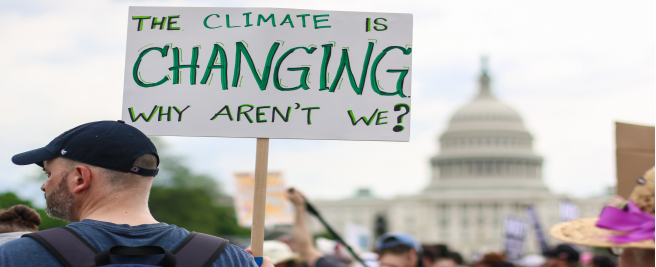
18 Feb Carbon neutral economy: Why you need to buy in NOW
“There is no company whose business model won’t be profoundly affected by the transition to a net zero economy.”
Larry Fink, co-founder BlackRock
Letter to CEOs, 2021
Climate change, previously known as global warming, increasingly impacts not just global weather but also its societies, politics and commerce. The issue has moved from conference margins to centre-stage, driving policy action by leaders of the world’s largest states and corporations. This article explores these developments and considers the likely impact of climate change on politics and commerce in ASEAN.
Quick fix or “greenwashing”?
At the United Nations’ Conference of the Parties (COP21) agreement in Paris 2015, states agreed to limit global warming to well below 2OC, preferably below 1.5OC compared to pre-industrial levels. To achieve this long-term objective, countries pledged to reach global peaks of greenhouse gas emissions and then achieve subsequent reductions for a carbon neutral world. Signatories including China, Japan, South Korea, E.U., U.K. and U.S. have since committed to achieve their own carbon neutrality by 2050 (2060 for China). Pledges alone won’t implement the Paris agreement, so countries also need to submit their “Nationally Determined Contributions”, or NDCs, to ensure Paris ambition is actually implemented in time. Currently just 75 countries from 197 have presented their NDCs. The next UN Convention round will be COP26 to be held in Glasgow, U.K. in November 2021. It is billed as the most significant since COP21 in Paris. Climate change finance, NDCs and implementation of prior pledges will feature prominently. The consequences of the Paris commitments, and their continuing evolution, are profound.
Yet “carbon-neutral” isn’t as simple as it sounds.
On one hand, policymakers, consumers and producers who meet their demand are adapting to embrace this carbon-neutral future. Nuclear energy, heat pumps, wind and tidal power will all feature even more prominently. Solar panels of photovoltaic cells produce genuinely sustainable, renewable energy in rising quantities in both domestic and industrial applications. However, there is growing fear that policy capture by lobbying corporates has enabled greenwashing of corporate strategies that remain fundamentally unsustainable.
There is a growing call for “pro-forestation – to allow trees to reach their biological age” as newly planted trees require decades to become a sink, a privilege of time we do not have. There are no substitutes for ancient forests with their rich biodiversity, yet their carbon neutral count carries no premium.
Carbon capture usage and storage (CCUS), which basically seals CO2 in rocks and under the sea, has been promoted as the “quick fix” we all need but sadly it is increasingly being viewed as a failed model. While biofuels reduce greenhouse gas emissions, their long-term environmental impact is often even worse than fossil fuel extraction. Biofuels are more expensive to operate than renewable platforms and often have to burn more fuel to power the equipment to capture carbon in the first place. One by-product of the renewable energy (r)evolution is the batteries which store electrical energy for cars and other appliances. CO2 is no longer emitted by the car (although it may be in producing the energy its batteries store) but the waste batteries become a toxic environmental challenge – and their manufacture is also environmentally problematic.
For all its challenges, global carbon-neutrality is rightly still the preferred policy aim of the U.N. and member states are moving fast towards it.
Impacts on Asia
Much of Asia (including China) is particularly vulnerable to extreme weather events, including flooding from rain and rising sea levels. China is the world’s largest producer of carbon dioxide, c.28% of global emissions. It’s in the country’s own interest to minimise these ecological hazards by helping to reduce global warming, allowing its statesmen to take the moral high ground which USA under Donald Trump surrendered. President Biden’s new administration has firmly restored the United States’ green credentials. Indeed, climate change is one issue where the USA’s and China’s policy interests increasingly converge; this should be nurtured by both sides despite being in conflict on so many other fronts (in Taiwan, Hong Kong, North Korea, Myanmar, South China Sea, etc).
The 10 countries of ASEAN share similar self-interests of ecological hazard and commercial opportunity. Indonesia, Malaysia and Philippines are among the planet’s 17 “megadiverse” vital countries, with the most biodiverse coral reefs in the world. Indonesia’s rich biodiversity in ancient forests and sea meadows (“lungs of the planet”) is almost as vital to our planet as Brazil’s Amazon rainforest, yet their ecological miracle risks being undone by shorter-term commercial calculations.
Indonesia is among the five highest states for greenhouse gas emissions. The emissions vary significantly, being driven by irregular peatland megafires which release carbon accumulated over centuries. Following Paris, the country pledged 29-41% reduction by 2030 compared to a “business as usual” scenario. More recently, President Joko Widodo’s government has shown determined policies to curtail peatland burning, aiming for “improved land use and spatial planning, energy conservation, the promotion of clean and renewable energy sources, and improved waste management”.
De-forestation remains challenging, still driven by commercial appetite for palm oil, with Indonesia producing about half the world’s supply. It’s a sensitive subject both commercially and politically but at least the challenge is now well recognised. More positively, Indonesia is the world’s 2nd largest producer of geothermal power (after the U.S.) with massive potential to develop more, situated on the Pacific Ring of Fire and home to 139 volcanoes. Wind and solar power offer further potential, still largely untapped although necessary investment is now being ear-marked.
Malaysia’s Paris pledges were to achieve a 35% cut in emissions by 2030 relative to 2005 levels. More recently, state-owned energy giant Petroliam Nasional Bhd announced a target for zero emissions by 2050, right up with global corporates best practice.
Generally, ASEAN will follow the global climate change lead, especially since it broadly aligns West with East. ASEAN states have all signed up to the UN’s carbon-neutral commitments to some degree: land reclamation for “sustainable” biofuel is hardly re-wilding or re-forestation, but it beats pumping out CO2 from coal-fired power stations.
Green meets greed
Michael Douglas’ delivered his “greed is good” speech in Wall Street (1987) 24 years ago. The new generation of financiers can still agree with Gordon Gecko and see value in sustainable energy. BlackRock, the world’s largest asset manager, demands that all companies demonstrate plans to reach carbon zero by 2050 – and plans to drop laggards from their active portfolios. Environmental, Social and Governance [ESG] issues are now an agenda item at most corporate board meetings globally, pushed by policymakers and the industry regulators they appoint. Climate change finance generally and carbon markets in particular are a tool to support net zero efforts – private financial institutions have an important contribution to make here, as do multilateral global financial institutions (largely western-controlled). The tradeable market “price of carbon” (being the cost of releasing one tonne of CO2) is at a record high in Europe near EUR38 per tonne, reflecting EU legislation under its “Green Deal”.
2020 was the 3rd hottest year globally ever recorded. The past decade was the hottest in human history. Average temperatures in parts of Siberia are 5OC above their long-term averages. Polar ice caps are melting and sea levels rising. Like COVID-19, Climate change doesn’t respect national borders.
These are the hard facts and are what has driven even hard-nosed financiers like Larry Fink at Black Rock to demand change. He’s not alone: The United Nations, U.S.A., E.U., China, ASEAN, BlackRock, millennial financiers and even Gordon Gecko have all joined a growing Climate change coalition. Their motivations vary but they share one ultimate objective: saving human habitation on Planet Earth.
Buy in.
